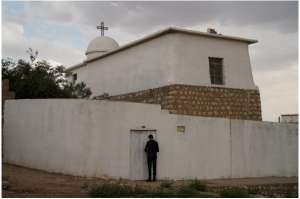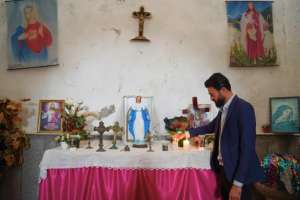The Yazidi family that keeps Mor Odisho Church alive
ALQOSH, Iraq — In a remote village in the Nineveh Plains of northern Iraq where no Christian families remain, the stone walls of Mor Odisho Church still echo with prayer — thanks to the quiet devotion of a young Yazidi man and his family. Wa’el Jejo, a Yazidi from the village of Nasiriya in the Chaldean-Syriac-Assyrian Alqosh subdistrict, holds the keys to the church — both literally and symbolically. Though Christians left the village decades ago, Jejo and his wife have made it their mission to care for the empty sanctuary. They volunteer their time to clean the church, open its doors to visitors, and keep its spirit alive.
“The church is a trust left to us,” Jejo said to ACIMENA, explaining that his parents asked him to take care of it before they themselves moved away in 2012. For Jejo, tending to Mor Odisho is a sacred responsibility — one he treats with the same reverence he would offer to a Yazidi temple.
Before entering the church, Jejo and his family remove their shoes, touch the walls, and kiss them in blessing. “We respect this place as we would respect our own holy sites,” he said.
In 2023, the Chaldean Diocese of Alqosh marked the feast of Saint Odisho — celebrated on the Sunday after Easter — with a special service in the church. It was the first major celebration in years. Since then, the church has slowly come back to life, with pilgrims visiting regularly on Sundays to light candles and pray to the saint for intercession.
The story of Mor Odisho Church mirrors that of Christian communities across Iraq, many of which have been devastated by decades of war, persecution, and displacement. The last Christian family left Nasiriya in 2003. Today, no Christians reside in the village.
But Jejo continues to call on them to return.
Iraq’s Christian population, which is overall majority Chaldean-Syriac-Assyrian, has plummeted over the past two decades — from well over a million before 2003 to an estimated 300,000-400,000 today — largely due to sustained conflict, discrimination, and attacks by ISIS militants. Many of the churches that once stood at the center of village life now lie abandoned.
Yet in Nasiriya, a Yazidi family’s act of quiet faith is keeping one church standing — and reminding the world that solidarity can outlive sectarian lines.




























